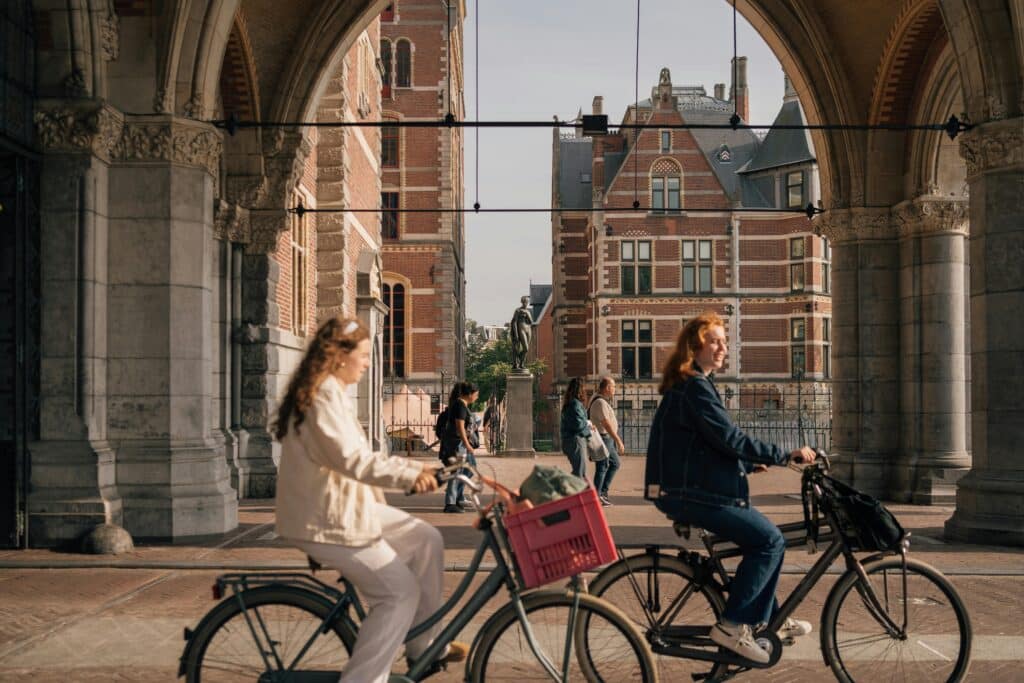
Its charming canals, rich history, and excellent quality of life make Amsterdam an appealing destination for expats from all over the world. Of course, even in a city as visitor-friendly as this one, moving to a new place can present some challenges.
So whether you’re relocating for work, study, or simply a new adventure, Remitly is here to help. Read on for practical information and advice for settling into Amsterdam and adapting to Dutch culture.
| Essential facts about Amsterdam | |
| Population | 918,000 |
| Popular neighborhoods | Jordaan, De Pijp, Amsterdam Zuid |
| Average rent for a one-bedroom apartment | 1,200 – 2,000 euros per month |
| Top industries | Finance, tech, food, creative industries |
| Number of expats | 174,000 |
Table of Contents
Understanding Amsterdam
Despite being a relatively small town by global standards, the Dutch capital city is a bustling European metropolis. It’s well known for its picturesque canals, iconic narrow houses, and world-class museums.
As one of Europe’s top destinations for expats, it’s home to a mix of cultures, including a large community of Americans, Canadians, and people from every corner of the globe. Dutch people are known for their friendliness and openness, and many speak English fluently—this is a huge plus when it comes to settling into your new home.
Another plus is the city’s location and extensive connections to other major European cities. These make it an ideal base for exploring other capitals like Paris, London, and Berlin, as well as closer destinations such as Rotterdam, Utrecht, and The Hague.
Neighborhoods and rental prices in Amsterdam
As we mentioned, Amsterdam is essentially a big city crammed into a small space. This means that accommodation can be one of the biggest challenges facing newly arrived expats. The competitive housing market, particularly in the city center, means rental prices can be high. Popular areas to live include:
- Jordaan: This trendy and historic neighborhood in the city center is known for its narrow streets, independent boutiques, and lively atmosphere. This area is popular with young professionals and expats who want to be close to cafes and cultural attractions.
Average rent here is above €1000 for a studio apartment, ranging to more than €3000 for three bedrooms.
- De Pijp: Another sought-after area, De Pijp is known for its multicultural atmosphere and vibrant street life. It’s a great choice for expats looking for a neighborhood that’s slightly more affordable but still lively.
Studios in De Pijp start around €700, with bigger apartments costing up to €2,500 per month.
- Amsterdam Zuid: A more upscale neighborhood, Amsterdam Zuid is home to many international families and expats. It’s quieter than the city center but still well-connected to the rest of Amsterdam.
Prices here range from €1000-€2500, but you get more space for your money.
Best places to look for an apartment
- Funda.nl: One of the most popular websites for finding rental properties and real estate in the Netherlands, this platform is a great place to start.
- Pararius.com: This large platform lists rental properties across Amsterdam and other major cities like Rotterdam and Utrecht.
- Real Estate Agents: Many expats use local real estate agencies to help navigate the market and secure a rental contract. This is probably the best option if you’re looking to buy a property.
Getting around in Amsterdam
Amsterdam is known for its excellent public transport system, which makes it easy to get around without a car. The transport network is well-funded by the Dutch Government and includes trams, buses, ferries, and the metro.
Public transport options
- Trams: one of the most convenient ways to travel around the city center
- Metro: ideal for longer journeys within Amsterdam or trips to the suburbs
- Buses: particularly useful for areas not serviced by the tram or metro lines
To use the public transport network, you’ll need an OV-chipkaart, which you can buy at train stations or online. This card allows you to pay for your trips across all forms of transport, and you can top it up as needed.
Of course, Amsterdam is also one of the most bike-friendly cities in the world. Cycling is an integral piece of Dutch culture and getting yourself a bike is part of settling in here.
Until you get your own two wheels, there are also a range of shared mobility options. Check out the best platforms here and make the most of the city’s endless bike lanes.
Essential services and amenities
When moving to a new country, setting yourself up with the basics is a key part of feeling at home. Here’s what you need to know about accessing healthcare, banking, and other services in Amsterdam.
Healthcare
The Dutch healthcare system is ranked as one of the best in the world. To access it, you’ll need to register with a general practitioner (GP) in your area.
It’s important to note that contracting a basic private healthcare policy is mandatory for residents of the Netherlands. There are plenty of health insurance providers, and costs range from €100 to €150 per month, depending on the coverage.
Registering for a BSN
One of the first things on your to-do list when you move to Amsterdam is registering with the municipality. This process gives you a BSN (Citizen Service Number), which is essential for setting up things like a bank account, health insurance, and filing taxes.
Some municipalities require a pre-scheduled registration appointment, which can take a few weeks to get. Make an appointment as soon as you arrive to make sure the process runs smoothly.
Opening a bank account
Opening a bank account in the Netherlands is relatively straightforward. Popular banks for expats include ING, ABN AMRO, and Rabobank.
To open an account, you’ll just need your BSN, proof of residence, and a form of ID. Many banks offer services in English, and even open accounts online, making the process easier for non-Dutch speakers.

Managing your finances and cost of living
Like many capital cities, living in Amsterdam can be expensive, particularly when it comes to housing and dining out. Here’s a breakdown of a typical monthly budget for a single person:
- Housing: €1,200 to €2,000 for a one-bedroom apartment
- Groceries: €300 to €400 for basic groceries from supermarkets like Albert Heijn and Lidl
- Public transport: around €100 for a monthly public transport pass
Estimated monthly living costs for a single person living in Amsterdam are around €1000, not including rent. A family can expect to spend upwards of €3500, but of course these figures vary greatly depending on lifestyle.
Income tax and social security
As a resident of the Netherlands, you are subject to local taxes. Income tax rates range from 37.1% to 49.5%, depending on your earnings bracket. Immigrants can also benefit from a series of tax reductions, so be sure to seek financial advice from a professional to stay up to date.
Social security contributions are deducted directly from your salary and cover things like unemployment benefits, pensions, and healthcare.
Social life and community
Making new friends and integrating into the local community is an essential part of settling into any new place. Amsterdam has a lively social scene and offers plenty of opportunities to meet other expats and locals.
Expat meets and social clubs
There are a host of clubs and organizations catering to expats in Amsterdam, including groups for specific nationalities, such as American, Canadian, British expats.
Popular platforms like Meetup.com and Internations are great for finding social events – in fact, the Meetup platform hosts this Amsterdam Expat Group that calls itself “largest and coolest international community in the Netherlands.”
Entertainment and dining
Amsterdam is famous for its vibrant cafe culture, with cozy spots throughout the city where you can enjoy a cup of coffee, a meal or, famously, something a little stronger.
Besides its cafe scene, the city is also home to a huge range of international cuisines, from French and Italian to Indonesian and German. For those who prefer something more traditional, be sure to try typical Dutch dishes like bitterballen and stroopwafels.

Working and studying in Amsterdam
Amsterdam is a thriving hub for international business, education, and innovation. At the same time, the Netherlands is known for its attitude to work-life balance, making it an attractive destination for professionals and students.
Work permits and residency
If you’re an EU citizen, you don’t need a work permit to live and work in Amsterdam.
However, if you’re from a nation outside the EEA, such as from the USA or Canada, you’ll need to apply for a residence permit and work permit through the IND (Immigration and Naturalization Service). Your employer will often assist you with this process.
Job market
The job market in Amsterdam is competitive, particularly in industries like technology, finance, and logistics. International companies often seek English-speaking professionals, but knowledge of the Dutch language will always be an asset.
The average gross salary for an expat living in Amsterdam is €52,000 in 2024.
Education system
Amsterdam has a well-regarded education system, and there are several international schools catering to expat families. Schools like the British School of Amsterdam and the International School of Amsterdam are popular choices.
However, if you’re planning to stay long-term, enrolling your child in a Dutch school can help with language and cultural integration.
Practical tips for newcomers
Customs and etiquette
The Dutch people take pride in their directness and openness, so don’t be offended if people are sometimes a bit too honest!
Punctuality is highly valued, and it’s common to greet people with a handshake when meeting for the first time.
Language
The level of English in the Netherlands is among the best in the world as a second language. Most Dutch people speak English fluently. However, making an effort to learn some basic Dutch phrases can make integration easier and shows your respect for the local culture. There are many language learning apps that can help.
Useful resources
These are our top three websites to help you get set up in your new life in Amsterdam:
FAQ
Yes, US citizens can move to Amsterdam, but they need a valid visa or residence permit, such as a work visa, student visa, or the Dutch-American Friendship Treaty (DAFT) visa for self-employed individuals.
To live comfortably in Amsterdam, a salary of around €3,500 to €4,500 net per month is typically recommended, depending on lifestyle, housing, and family size.
As is the case with any European country, immigrating to Amsterdam can be straightforward if you have a job offer, are self-employed, or are a student. However, navigating visas, housing, and legal processes can be complex, requiring preparation.
Yes, US citizens can retire in the Netherlands, but they need to meet specific requirements for residency, income, and health insurance. The DAFT visa is one option for retirees.
Yes, Amsterdam is a great place to settle, offering a high quality of life, excellent public transport, diverse culture, and a welcoming expat community. However, like Switzerland and Germany, the cost of living can be high.
